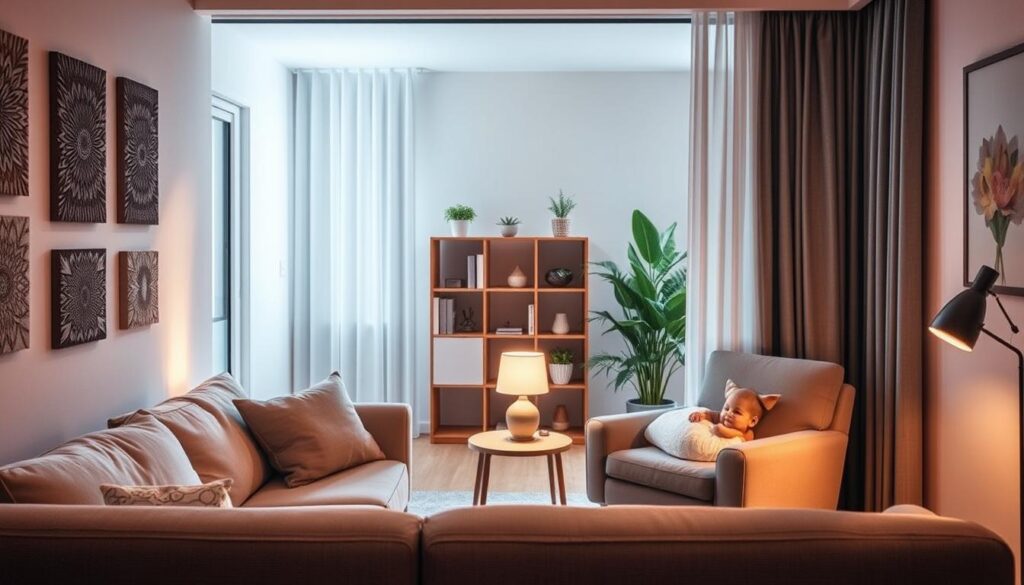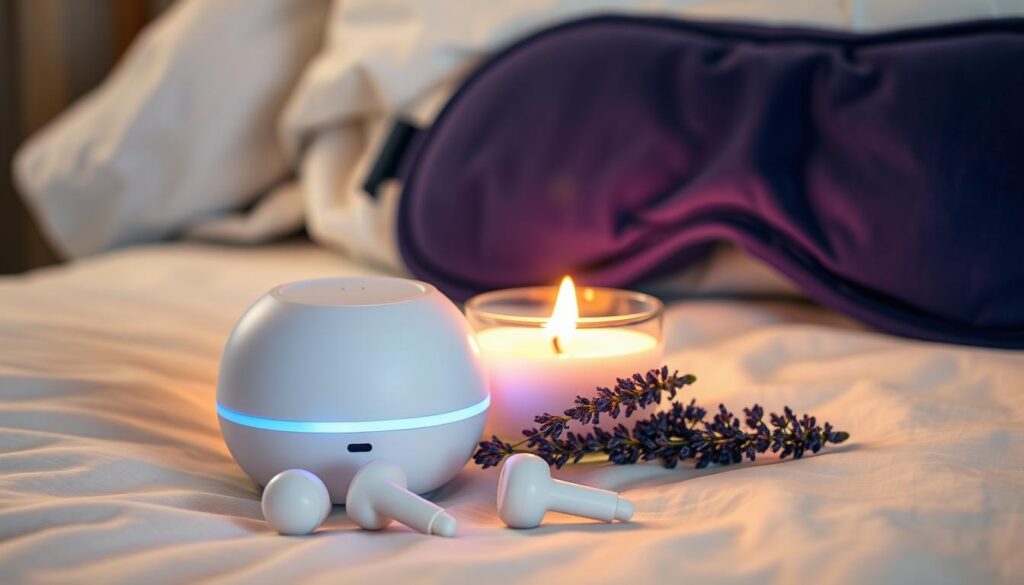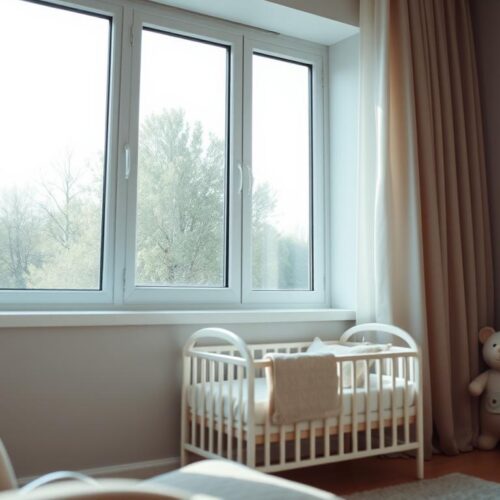Managing noise from neighbors is essential for your newborns’ peaceful sleep. Loud sounds from nearby can upset your baby’s sleep. Knowing how to soundproof for babies and using ways to cut down this noise is crucial. This guide will show you how to lessen neighbor noise. It will help improve your baby’s sleep for their well-being.
Understanding the Impact of Neighbor Noise on Newborns
Neighbor noise can really mess with your newborn’s sleep. Babies are super sensitive to sounds in their first months. Noisy neighbors might keep them awake longer. Studies show this can make babies cry more and sleep badly.
But it’s not just about sleep. If babies don’t sleep well, it might affect how they think and remember things. Creating a quiet space is key. It helps not just with sleep, but with their overall health and happiness.
Recognizing the Sources of Noisy Neighbors
It’s key to know what makes neighbors loud to help your newborn rest better. Noises from late-night parties, loud equipment like lawnmowers, and normal activities can disturb infants. These can include sudden loud sounds or conversations that echo into your home.
Knowing the different noises helps you tackle them better. This way, you can create a quieter place for your newborn’s sleep and happiness.
Creating a Soundproof Environment
It’s crucial for a newborn’s health to have a soundproof environment. Effective soundproofing improves babies’ sleep, helping them grow in peace. Using soundproof curtains and installing door draft blockers cuts down outside noise.
Utilizing Soundproof Curtains
Soundproof curtains are perfect for a nursery. They soak up sound, lowering noise from outside. Go for heavy curtains that also block light, making your baby’s room quieter.
Get curtains advertised as soundproof for best results. They have extra layers that dampen noise, making your child’s sleep area quiet and restful.
Installing Door Draft Blockers
Door draft blockers also help soundproof a room. They seal door bottoms to keep noise out. It’s easy to install them, and they match your decor while blocking noise.
Sealing doors makes your home quieter. It’s key for making a peaceful place where your newborn sleeps well.
Effective Noise Reduction Techniques
Creating a calm environment for your newborn is key. Two main ways to do this include white noise machines and improving home insulation. This involves covering vents and sealing off any drafts.
Using White Noise Machines
White noise machines are now more popular. They help hide distracting sounds with a constant, soothing noise. When choosing one, make sure it’s not too loud for your baby’s ears. A moderate setting can block out the noise from neighbors or the street. This helps your baby sleep better.
Covering Vents and Sealing Gaps
Covering vents and sealing cracks can also keep noise out. This method keeps your baby’s room quieter. Use weatherstripping and acoustic foam for best results. These small changes can make a big difference in how well your newborn sleeps.
Rearranging Furniture for Noise Management
Effectively managing noise in your home can mean rearranging your space. By moving furniture around, you can lower sound levels. Doing this makes your place more comfortable and peaceful, especially if you have a newborn.

Identifying Sound Sources in Your Home
To manage noise with furniture, first find where the noise comes from. Walk around your home and listen. Pay attention to loud spots, like walls next to noisy neighbors, windows by busy roads, or places where sound bounces around.
If noise comes through a shared wall, try putting a bookshelf or big furniture against it. Soft furniture like sofas can soak up sound, helping your home be quieter. Adding rugs and cushions with your furniture can block more noise, creating a calm space for you and your baby.
Neighbor Noise and Newborns: Communication Strategies
Talking with neighbors helps a lot when you’re dealing with noise. Having a nice chat about raising a newborn might bring some understanding. This lets neighbors know why it’s important to keep it down during late hours.
Try these tips when talking to neighbors:
- Choose an appropriate time to talk, ensuring they can focus on your concerns.
- Be specific about the times when noise can be especially disruptive, such as late at night or early in the morning.
- Express appreciation for their cooperation and consideration in advance.
- Encourage mutual understanding by listening to any feedback they might have.
Talking well with your neighbors can help manage noise better. Working together helps make home a peaceful place for you and your baby.
Why It’s Important to Maintain Good Neighbor Relations
Having good neighbor relations is very important, especially for families with newborns. Creating a friendly atmosphere in your community helps everyone feel supported. Getting along with your neighbors means they might be more understanding about noise.
Being on good terms with your neighbors helps solve conflicts faster. Open communication lets you talk things out, reducing tension. This creates a peaceful neighborhood for you and your family.
Making an effort to bond with your neighbors has lasting advantages. Neighbors who feel respected are more considerate of others’ needs. In a supportive community, conflicts, like noise complaints, are less likely.
Handling Noise Complaints Calmly and Effectively
Dealing with noise complaints can be tough. It’s important when it messes with your home’s peace. Staying calm is key. Talking things out calmly with your neighbors is the best way to handle noise troubles. This approach helps everyone understand each other and work together to find a solution.
To talk about noise issues, remember these tips:
- Pick a good time for the conversation, ensuring no distractions.
- Share how the noise affects you using “I” statements. For example, “I find it difficult to concentrate when the music is loud.”
- Really listen to what they have to say. It can lead to a helpful talk.
Being open and patient helps solve noise problems well. Good communication does more than fix the noise issue. It also makes the relationship between neighbors stronger. This sets the stage for living together more peacefully.
Benefits of Apologizing for Baby Disturbances
Saying sorry for your newborn’s noise can really help get along with your neighbors. It shows you know raising a baby isn’t easy. And it helps everyone feel more connected.
When you say thanks for their patience, you make the neighborhood friendlier. This is great for all families, especially when their babies are loud too. Being kind makes your relationships with neighbors stronger, as you all go through parenting ups and downs together.
| Benefit | Description |
|---|---|
| Promotes Understanding | Apologizing for noise encourages empathy between neighbors as they understand the challenges of having a newborn. |
| Builds Respect | Acknowledgment of disturbances demonstrates your respect for their space, leading to a more harmonious living environment. |
| Encourages Patience | Assuring neighbors that you appreciate their understanding can foster patience during challenging times. |
| Cultivates Community | Fostering goodwill through communication creates a supportive network of families who can aid one another in times of need. |
Creating a Sleep Kit for Your Neighbors
Making a sleep kit for your neighbor is a kind way to show you care when dealing with noise. You can put together items that help your neighbor relax and sleep better. This is a great way to say sorry for any noise while building a good bond.
A well-thought-out sleep kit can have:
- High-quality earplugs to block out unwanted sounds.
- Calming herbal teas that help with relaxation before sleep.
- Essential oils with calming effects.
- A cozy blanket or sleep mask for extra comfort.
Giving a sleep kit to your neighbor can help lessen any tension and shows you’re serious about keeping noise down. It encourages open talks. This way, you and your neighbors can work together on any issues.

The Role of Solid Communication with Neighbors
Talking well with your neighbors is key to keeping peace, especially about noise. Having open chats helps neighbors get along better and be more aware of noise. Regularly talking about day-to-day stuff and noise issues helps build a friendly environment.
Start by introducing yourself and talk about noise concerns you might have. Being friendly makes it easier to find solutions that help everyone. When they see you’re considerate of their plans and likes, they’re likely to do the same for you.
Here are some good ways to talk about noise with your neighbors:
- Initiate casual conversations about noise levels during friendly interactions.
- Share your concerns in a respectful manner without sounding confrontational.
- Offer solutions when discussing noise issues, such as adjusting specific activities to quieter times.
| Communication Strategies | Impact on Neighborly Relations |
|---|---|
| Open dialogue | Builds trust and cooperation |
| Respectful discussions | Reduces misunderstandings |
| Offering solutions | Encourages collaborative adjustments |
Improving how you talk with neighbors can prevent conflicts and make living together better for everyone.
Involving Management for Persistent Noise Issues
If you’re facing ongoing noise issues, getting your apartment management involved is a good idea. They’re key in solving noise problems and making sure rules are followed. If self-help methods haven’t worked, management can offer extra help.
Apartment managers know how to deal with noise complaints well. They work to keep peace by talking about what noise levels are okay. They also have steps for dealing with complaints that include making official notes. They might give warnings or set up meetings to talk things out.
When talking to management, be clear about when and how the noise bothers you. Good communication shows how serious the problem is. Keep a record of all the noise issues, like when they happen and steps you’ve tried to fix them. This helps prove your point and gets management to act.
Considering the Use of Technology for Noise Control
Technology for noise control brings new ways to fight off unwanted sounds. Many parents use soundproofing to make their baby’s sleep area quieter. Things like white noise machines help block out sounds from neighbors.
Nowadays, parents have cool tech to control noise. These gadgets play calming sounds to hide the loud ones, helping babies relax. Plus, there are apps that let you pick the sounds your baby likes best.
Thanks to soundproofing tech, finding quiet is easier for parents. This mix of new and old sound fighting tactics is key, especially where it’s noisy often. When looking for solutions, mix traditional and new methods to help your family find peace.
Exploring Long-term Solutions for Noise Reduction
Finding good ways to reduce noise can make life better for families with babies. Using things like acoustic panels or special insulation can solve noise problems for good. These materials block out sound, making your home quieter.
When you invest in these solutions, you cut down on outside noise. This makes a better place for your newborn to sleep well. Even though it might be expensive at first, the peace you get at home is worth it. Think about what kind of soundproofing you need, such as:
- Acoustic insulation in walls and ceilings
- Suspended ceilings with sound-absorbing materials
- Double-glazed windows to keep out street noise
- Sealants to fill gaps around doors and windows
Looking into these noise solutions can turn your home into a peaceful place. Good soundproofing means a happier and quieter environment. It leads to better sleep for you and your baby.
Parenting Tips for Managing Sleep Patterns
Parenting well can really help your newborn sleep better. One key tip is to keep their sleep area the same each night. This means the room should be dark, quiet, and not too hot or cold. Also, putting your baby to bed at the same time every night helps them know when to sleep.
Doing calming things before bed is important for your baby’s sleep. Try rocking gently, singing, or playing quiet music. These acts let your baby know it’s time to rest. Even if there are noises, these calming routines help your baby sleep better.
Swaddling your baby can make them feel safe and cozy, helping them sleep through noise. Using a white noise machine can block out other sounds. Together, these tips can help your baby sleep well, even when it’s noisy.
Conclusion
It’s very important to manage neighbor noise when you have a newborn. This is because their sleep is key to their health. Using soundproof curtains and white noise machines can make a big difference. Also, talking kindly with your neighbors can build respect and better living situations.
Plus, using things like door draft blockers and sealing gaps keeps noise out. This improves your baby’s sleep. Being ahead of these issues helps your baby rest well. It also creates a feeling of community with your neighbors.
In the end, finding a balance with your neighbors matters a lot. By being thoughtful and respectful, you can deal with noise issues well. This leads to a peaceful home for your baby.




